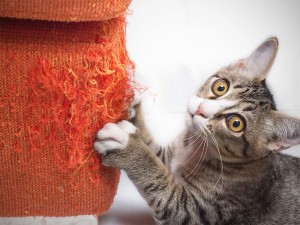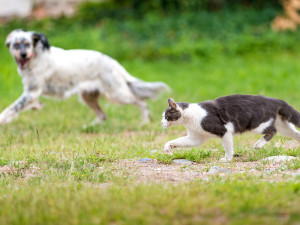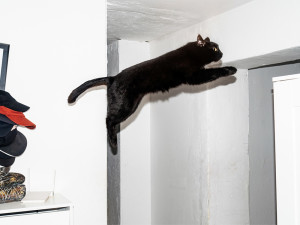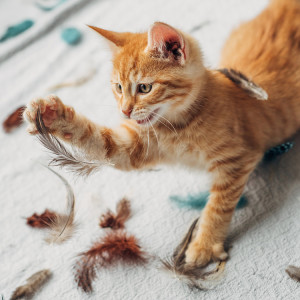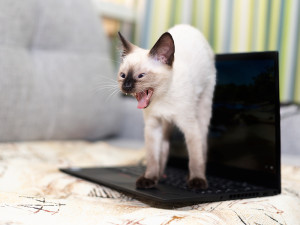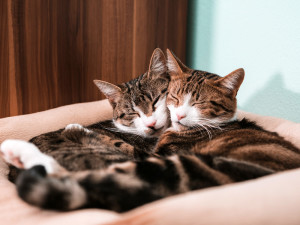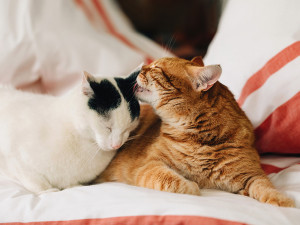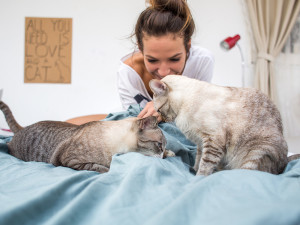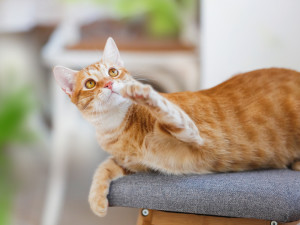Why Does My Cat Stretch When They See Me?
It’s cute, but what does it mean?

Share Article
In This Article:
Why Do Cats Stretch So Much? Why Do Cats Stretch Before Coming To You? Types of Cat Stretches Possible Health Concerns with Excessive Cat Stretching Frequently Asked Questions
Cat parents are all too familiar with the sight of their pet languidly stretching before greeting them after a long day at work. While dogs tend to be effusive with their hellos, cats may seem more aloof at times, but they just have their own ways of greeting you and showing affection.
Like many animals, cats communicate through body language (and yes, the occasional vocalization). A slow stretch when you arrive home may be your cat’s way of acknowledging your presence and saying hello. They could even be asking for playtime. According to cat behaviorist Kristiina Wilsonopens in new tab, the meaning of stretching all depends on the context.
“It can be a way to communicate happiness or a way to initiate play,” Wilson says. “Stretching can also just be a stretch. If your cat has been sitting for a long time and gets up to greet you, they may feel the need to stretch (and feel safe and relaxed enough to do so) on their way over.”
Why do cats stretch? The short answer: for any number of reasons, both physical and affectionate. Read on to take a deeper look at your cat’s flexible behavior.

Why do cats stretch so much?
Cats spend most of their day (around 16 hoursopens in new tab on average) asleep. When you return home, you’re likely interrupting yet another nap time, so your cat may simply stretch their legs before getting up. A stretch before greeting you can also be an invitation to play or an indication that your cat is ready for your attention, so have those toys ready for some mentally stimulating activity to avoid unwanted behaviors.
Why do cats stretch before coming to you?
So, why does your cat often greet you with a luxurious stretch? Cats stretch for both physical reasons and more emotional ones. When you see your cat stretch, the meaning could vary — or could encompass multiple feline needs. Your cat may be letting you know that they care for you while also helping their blood circulate after a long, lazy nap.
Affection and bonding
Stretching may be a sign of affection from a cat and a way of expressing a sense of comfort in your presence. A simple stretch can be a strong bonding gesture, strengthening your relationship, and one of the signs your cat loves you. Your cat could also use stretching as a way to prepare for playtime, loosening up their muscles and preparing to pounce.
Flexibility and circulation
After a long nap (aka most of their daily schedule), your cat may need to recover some muscle flexibility and boost their circulation. Stretching helps cats wake up their sleepy limbs and get the blood flowing, especially after spending a long time in a sedentary position, whether snuggled up in their own bed or lying at the foot of yours.
Trust and vulnerability
Why do cats stretch in front of you? It may be because you make them feel safe. Stretching is a vulnerable position for a cat because it prevents them from easily fleeing or preparing for an attack. When your cat stretches in front of you, they’re demonstrating their comfort and trust in you, signifying that they feel secure in your presence and trust you in their most vulnerable moments.
“Stretching is often a sign of happiness, relaxation, and trust,” Wilson says. “These cats may be showing just how contented they are when they see their people.”
Territory marking
If you’ve ever wondered, Is my cat marking me? when they stretch before saying hello, you may be on the right track. Cats are very territorial animals and have many ways of marking what they view as their property. Because they have scent glands in their paws, when cats stretch, they leave their scent behind, essentially saying, “This is mine.”
Types of cat stretches
Cats are incredibly flexible and have a wide repertoire of stretching poses. You may have seen your cat stretch into some unusual positions, but below are a few common ones.
Full-body stretch
Your cat may stretch all four legs while lying on their back, enjoying a full-body stretch that ripples from head to tail (or vice versa). If you wonder how to know if your cat loves you, a full stretch is a good indication that they feel safe in your presence.
Pretzel poses
Cats have a tendency to contort and stretch their bodies in unusual positions. They may twist around with their head down while also wiggling their entire body, indicating a playful attitude.
Paw stretches
Sometimes cats stretch a single paw at a time. This lazy stretch is common when your cat is just waking up or still in a sleeping position. Why do cats stretch their paws? Often, for the same reasons they do any other stretch: physical comfort, affection, or territory marking.
Arched back stretch
Maybe the most common stretch cat parents see is similar to the downward dog yoga pose (downward cat?). In this stretch, your cat may extend their front legs while arching their back and stretching their rear legs.
Possible health concerns with excessive cat stretching
While stretching is a normal part of cat behavior, too much stretching could indicate your cat is uncomfortable in some way. If you feel that your cat’s stretching has become excessive or they seem to be in pain, contact your veterinarian.
Pain
Knowing and recognizing when your cat is in painopens in new tab is critical to providing your beloved pet with the care they need. Learn your cat’s normal behavioropens in new tab so you can more easily note any deviations. If your cat is stretching more often, for example, they may be feeling pain that they’re trying to ease.
Age-related changes
Just like humans, cats may experience more joint soreness and stiffness as they age. Signs of arthritis and other joint conditions include a hesitancy to jump, exercise, or climb — all activities that cats normally enjoy.
FAQs:
How do I massage my cat?
Just like with humans, a massage can help your cat relax. Start by stroking your cat’s body slowly from head to tail, applying gentle pressure with a flat hand.
How can I tell if my cat loves me?
If your cat seeks you out and exhibits affectionate body language, like soft head butts and rubbing against you, they likely have feelings of love toward you.
Why does my cat roll and stretch in front of me?
Stretching and rolling is a common cat reaction to things they enjoy or find comforting — in this case, you!
References:
Marangoni, Sabrine, et al. “An Ethogram of Acute Pain Behaviors in Cats Based on Expert Consensus.” PLOS ONE, vol. 18, no. 9, 28 Sept. 2023, pp. e0292224–e0292224, https://doi.org/10.1371/journal.pone.0292224. Accessed 28 Nov. 2023.
“Signs and Signals Your Cat is in Pain.” Chirrups and Chatter. https://www.montgomerycountymd.gov/animalservices/Resources/Files/SignsYourCatisinPain.pdf Accessed 20 November 2024.
“Keeping Your Indoor Cat Happy | Orange County, NC.” Www.orangecountync.gov, www.orangecountync.gov/1332/Keeping-your-indoor-cat-happy.
“Why Do Cats Sleep so Much?” Oakland Veterinary Referral Services, 6 Sept. 2017, www.ovrs.com/blog/cats-sleep/.
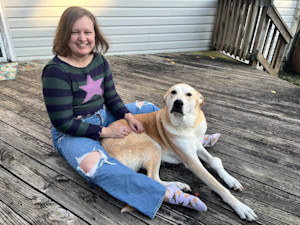
Savannah Admire
Savannah Admire is a writer and pet mom to two dogs and a cat. Under the name Savannah Cooper, she has published poetry in 40 different publications, as well as a poetry book, Mother Viper (2025). When she’s not writing, you can find her reading, taking photos, or volunteering as a content creator for her local community theatre. As a pets writer, she focuses on cat and dog behavior and pet parenthood. She currently lives in Western Maryland.
Related articles
![A cute orange tabby kitten playing with feathers.]()
Is Orange Cat Behavior Real? The Truth Behind the TikTok Trend
Your TikTok algorithm would like you to think so, but the experts weigh in.
![An angry and hissing Siamese kitten standing on top of a laptop computer in the living room]()
You Don’t Have to Live Like This—You Can Get a Trainer For Your Cat
Tips to help you find a legit behaviorist (according to a veterinary behaviorist).
![Two tabby cats in embrace lying in cushion.]()
What Are Cat Pheromones and How Do They Work?
Communication is key, and pheromones are your cat’s version of DMs.
![Two tabby cats cuddling each other with their eyes closed]()
Cats Aren’t Loners, After All
Cat behaviorist Kristiina Wilson on the importance of socializing cats.
Do Cats Get Jealous? Exploring Feline Emotions and Social Dynamics
Is there a green-eyed monster hiding in that adorable ball of fluff?
![orange cat lifting its paw]()
Why Do Cats Raise a Paw for No Reason?
Are they saying “Hi” or trying to high five? Cat behaviorists decode your pet’s cryptic hand signal.


